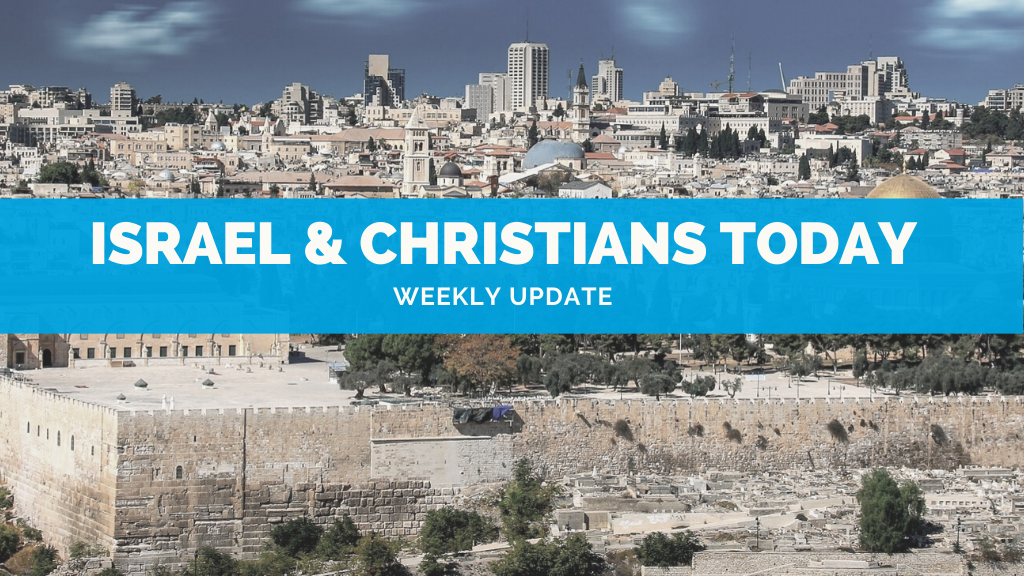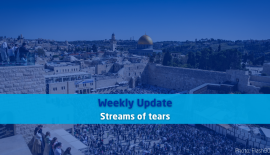Weekly Update: Our journey
This week, starting on 20th September, the Jewish people celebrate the Feast of Tabernacles. The emblem of this “Festival of Booths” (Hebrew: Sukkot) is the sukkah, a temporary dwelling built outside with a roof made of organic material, often palm or tree leaves, known as sechach. For one week, meals are eaten there, and some people even sleep in the sukkah. On each day during Sukkot, Jews are commanded to perform a ceremony with the “Four Species” or “Four Kinds”: the lulav (palm frond), hadas (myrtle), arava (willow) and etrog (citron fruit), which are mentioned in the Torah (Leviticus 23:40).
Sukkot is one of the three main Jewish festivals commanded by the Lord – Pesach (Feast of Unleavened bread), Shavuot (Feast of Weeks) and Sukkot (Feast of Tabernacles). Jews were commanded to go up to Jerusalem to celebrate these festivals. Each has its significance for Israel, its fulfilment in Jesus Christ, and its prophetic significance for the coming Kingdom.
Because it is celebrated at the time of the harvest, the Feast of Tabernacles is prophetic of the restoration of the Jews to the land, and the ingathering of the gentiles. The prophet Zechariah predicts the time when the Jews will have been restored (at least partially) to the land, and the nations will gather against Jerusalem. The Messiah will come to destroy those nations that seek to destroy Jerusalem. Then those nations that survive will go up year after year to worship the King, the Lord Almighty and to celebrate the Festival of Tabernacles (Zechariah 14:16).
The Lord has been gathering His children the Jewish people from the four corners of the earth over the last 150 years, and He continues to do so today. And today we also see the nations preparing more and more to “attack” Jerusalem – so far only with words (for example, the constant condemnation of Israel’s reunification of the city since 1967) but there will come a time when they will attempt to “fight against” the city with military might. And so these prophecies of Zechariah are being fulfilled before our very eyes.
Just as the Lord is faithful to fulfil His promises towards the Jewish people, so too He will be faithful to gather the gentiles into His great harvest, when the Son of Man will come in glory to gather His elect (Matthew 24:30-31). This speaks to us of a time when the owner of the vineyard will return to see which of His servants are faithful, doing the things He has commanded, “producing fruit” (Matthew 21). And of the owner of the house who returns unexpectedly, hoping to find his faithful and wise servants “giving others their food at the proper time” (Matthew 24). It reminds us of the ten virgins who were waiting patiently with their oil lamps filled (Matthew 25), and of the marriage of the Lamb with His bride (Revelation 19).
The feast of Tabernacles is thus a reminder to all God’s children that we are on a journey, towards the coming of God’s Kingdom. Those who put their trust in the God of Israel are pilgrims in this world. Our calling is heavenly, not earthly (Philippians 3).
Let us praise God for His faithfulness to the Jewish people, through which He is showing the glory of His name to the nations. Let us be found faithful – praying, waiting and watching, blowing our trumpets, and doing those things the Lord has commanded us to do in preparation for His coming.
Tabernacles reminds us where we came from
The late Rabbi Jonathan Sacks explains that the Feast of Tabernacles reminds the Jews where they come from. It is also a message to the nations: “Every time a nation forgets its youth, its childhood, the hard times they had when they were struggling to make a go, they become decadent, and they eventually decline.” He also says that Tabernacles reminds that we don’t need magnificent possessions to experience God’s love. “In this temporary life, when we Jews look to God alone, and to each other in love, He covers us with clouds of glory, as He covered the Jewish people in the tabernacle in the desert.”
> Watch video
What is a sukkah?
Kees de Vreugd writes: “The Hebrew word “sukkah” is related to a verb that means “to cover”. So, what is really important is the rooftop. The sukkah recalls the living in the desert under God’s care. It is also a symbol of the transience of existence. The used materials all have a temporary quality.”
> Read more..
Living by faith, that is what Sukkoth is all about
Rev. Willem Glashouwer writes: “It is good that we realise ourselves that we are pilgrims. That we should not be too seriously attached to the things of this world. That we should be like Abraham, to whom God said in Genesis 12:1: “…The LORD had said to Abram, “Leave your country, your people and your father’s household and go to the land I will show you…”
> Read more..
Tabernacles, Trumpets and Kingdom
In this teaching, Amir Tsafarti explains the prophetic significance of the Feast of Tabernacles for our time. “The Feast of Tabernacles speaks of the Millennial kingdom, when the Lord will tabernacle with His people. The time of the fulfilment is near.”
> View video..
Members of lost tribe of Bnei Menashe celebrate Sukkot in northeastern India
Their ancestors wandered Central Asia and the Far East for centuries before settling along the borders of Burma and Bangladesh. Like many Jews around the world, members of the Bnei Menashe community in India are gathering to celebrate Sukkot this week. In their festival prayers, they offered a special plea to fulfill their age-old dream to make aliyah during the coming year.
> Read more..
Why Arabs no longer trust the Muslim Brotherhood
Khaled Abu Toemeh writes at Gatestone Institute: “Since its establishment in 1928, the Muslim Brotherhood’s main motto has been ‘Islam is the solution’ (to all problems). The organization’s followers have used this slogan over the past decade to rise to power in a number of countries, including Egypt, Tunisia, Morocco and Sudan. The past few weeks, however, have shown that many Arabs and Muslims no longer believe in the Muslim Brotherhood’s ability to govern or in the claim that ‘Islam is the solution.’”
> Read more..
The Glory| Episode 12 in video series on Romans 9-11 with Johannes Gerloff
Every created thing has a certain “glory”, bears some “weight”, leaves an impression, if someone sees it. Even if something or someone is repeatedly overlooked it says something about the object that should have been noticed, or about the observer. There is a lot that may be said about the word “glory”. If Paul, however, states that the Jewish people has the Glory, he says something about God’s relationship with this unique nation.
Scripture for the week:
A day of the Lord is coming, Jerusalem, when your possessions will be plundered and divided up within your very walls. 2 I will gather all the nations to Jerusalem to fight against it; the city will be captured, the houses ransacked, and the women raped. Half of the city will go into exile, but the rest of the people will not be taken from the city. 3 Then the Lord will go out and fight against those nations, as he fights on a day of battle.4 On that day his feet will stand on the Mount of Olives, east of Jerusalem, and the Mount of Olives will be split in two from east to west, forming a great valley, with half of the mountain moving north and half moving south. 5 …
12 This is the plague with which the Lord will strike all the nations that fought against Jerusalem: Their flesh will rot while they are still standing on their feet, their eyes will rot in their sockets, and their tongues will rot in their mouths. 13 On that day people will be stricken by the Lord with great panic. They will seize each other by the hand and attack one another. 14 Judah too will fight at Jerusalem. The wealth of all the surrounding nations will be collected—great quantities of gold and silver and clothing. 15 A similar plague will strike the horses and mules, the camels and donkeys, and all the animals in those camps.
16 Then the survivors from all the nations that have attacked Jerusalem will go up year after year to worship the King, the Lord Almighty, and to celebrate the Festival of Tabernacles. 17 If any of the peoples of the earth do not go up to Jerusalem to worship the King, the Lord Almighty, they will have no rain. 18 If the Egyptian people do not go up and take part, they will have no rain. The Lord will bring on them the plague he inflicts on the nations that do not go up to celebrate the Festival of Tabernacles. 19 This will be the punishment of Egypt and the punishment of all the nations that do not go up to celebrate the Festival of Tabernacles.





